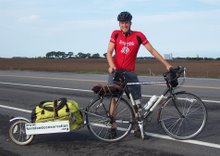I'd really love to tell you all about Twin Creek Ranch in Wyoming, but I'm short on time. I'm trying to beat the snows so must keep moving. This was one of my most powerful visits yet. I was beginning to feel like I was wasting my time riding my bike through this part of the arid west until this visit. I've included below a newsletter article I just submitted to Georgia Organics who graciously requested I write about my experiences. So the first part of this will be familiar to most of you.
Happy reading. Please let me know if you think of an outlet for these stories. Thanks again to Georgia Organics. Hope you won't mind me sharing this on my blog in advance of publication.
What is Farmland Conservation?
All great journeys begin with a great question. Earlier this year I decided to embark on a 5,000 mile bicycle tour through ten states from the Atlantic to the
Over these last three months I have visited over fifty farms, ranging from half acre garden plots of organic vegetables to 2,000 acre conventional grain farms and feedlot operations. I’ve planted and harvested more beautiful fruits and vegetables than you could imagine, milked cows and goats, gathered eggs, processed poultry grown on pasture, fed hogs, driven tractors, surveyed greenhouses, baled hay, tasted wines, picked wild mushrooms, interviewed Mennonites, shared meals with the Amish, and plunged headfirst into the 2007 farm bill. In my free time I’ve read books by Wendell Berry, Michael Pollan, and John Ikerd. I’ve been able to meet and ask questions of agricultural gurus such as Wes Jackson and Joel Salatin. I’ve also discovered my own personal heroes like Larry Decker, the owner of one of the only five organic wheat mills in the country, or Susana Lein who taught me the lesson, “nature doesn’t till, it builds the soil.” And now in this brief moment of reflection I can appreciate what an incredible blessing and tremendous education it has all been. And I’m only two-thirds there!
In preparation for this trip I also spent several months working for an industrial scale poultry operation in
My journey is more than a search for knowledge. I hope that in some small way I can express my thanks and appreciation for the landscape and the individuals that feed us. I appreciate the people who farm; especially the one’s who are struggling to keep their farms. Our food ultimately depends upon the natural and human resources spread out across the landscape. This trip is in honor of those individuals and that landscape. And yet, despite
I have begun to believe that it is not enough to eat better if we still lack those connections and relationships to the land and its producers. My opinion about how we really come to know and understand our world has changed dramatically over these last few months. Food nourishes more than just our bodies. The food you have sown and harvested yourself is good for you beyond those basic nutrients. This is followed by food from a farm you have personally visited, where the farmer can explain to you exactly how it was grown, when and why. Short of these experiences; look for food that has attached to it a story of the farmer and the land. Yesterday I ate a grass fed beef burger with fellow bicyclists, and I had just come from the ranch where the meat had been raised. As we sat happily munching I explained to them how sixteen years ago this rancher had decided to quit blowing up beaver dams. He had observed the consequential erosion and downcutting of his stream, and had a terrible feeling about what he had just done. So he quit blowing up the dams, and the beavers began to dam up the stream. In
After 16 years of working in collaboration rather than opposition to the beaver, the water table throughout the length of his valley has been elevated by as much as 6 to 8 feet. The riparian area is now subirrigated as the moisture spreads up the valley slopes. His riparian area has expanded, and his need for ditch irrigation declined. Not only has the production of grass improved, but because the cattle are only given access to these grasses once the plants have recovered, he never has to use fertilizer. I just want to tell you, that burger tasted better because of that story.
Food you can feel good about is food you can understand. Understanding comes most directly from experience, connections and relationships. To convey the value of this deeply rooted understanding to others we must learn to tell stories; stories of the food, stories of the land, and most importantly stories about people.

Tony Malmberg is the owner of Twin Branch Ranch....and a friend to the beaver. He stands here in front of vine ripening tomatoes. How many ranchers also pull tomatoes?



this is just fantastic.this young man should be awarded the highest honor.He has true qualities.He deserves Noble prize for raising such a noble issue.I want to meet this man.I love him.
Just to say Hi,
Your comments are really moving.
It reminds why we do what we do.
Glad it showed as you were traveling.
We are experiencing an exceptionally
cold spring as was the winter.
This is the time of year we mess with
our cows and calves and get ready to
go to grass with them.
Take care and stop in if you are
ever this way.
Judy, Ross and Ryan Kinlser